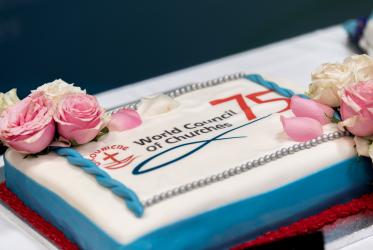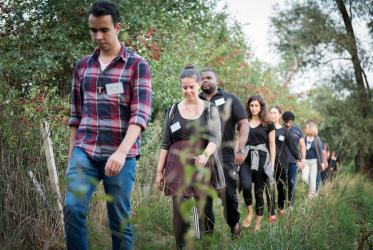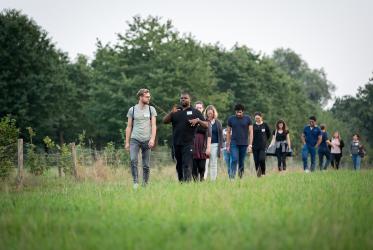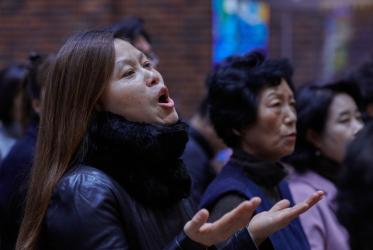By Stephen Brown*
Pope Francis has praised the ecumenical atmosphere of his visit to Geneva to celebrate the 70th anniversary of the World Council of Churches (WCC), and has said work by churches for peace is a mandate from God in a world threatened by crises.
“One thing I would like to say clearly: today was an ecumenical day, really ecumenical,” Pope Francis told the journalists accompanying him on the return flight back to Rome after his one-day visit on 21 June.
“It was a day of encounter,” said the pope, speaking in Italian, and standing with a microphone at the front of the section of the aeroplane reserved for journalists. “The right word for the day is ‘encounter,’ and when one person encounters another and feels appreciation for the meeting, this always touches the heart.”
The pope’s meeting with the WCC was described as an “ecumenical pilgrimage,” under the motto “walking, praying and working together.”
This experience at the meetings in Geneva had been “not mere courtesy, nothing purely formal, but an encounter between human beings,” said Pope Francis.
The need for “unity for peace” between churches had been among the issues discussed with WCC leaders, since the world was facing a “crisis of hope, crisis of human rights, crisis of mediation, [and] crisis of peace,” the pope added.
“For me, to be a peace church is the mandate of God,” he said. “I believe that all the churches that have this spirit of peace must come together and work together, as we said in our speeches today.”
Today, “peace is a necessity, because there is risk of a war,” Pope Francis underlined.
Conflicts needed to be resolved through negotiation, dialogue and mediation, said the pope, and not “like Cain,” a reference to the biblical story where Cain slays his brother Abel.
The WCC gathers 350 Protestant, Orthodox, Anglican and other churches representing more than 550 million Christians in over 120 countries. The Roman Catholic Church is not a member but cooperates with the WCC in some areas.
The pope’s visit to the WCC began with prayer at Geneva’s Ecumenical Centre, where the organization has its headquarters.
He then travelled to the WCC’s Ecumenical Institute at nearby Bossey for a private lunch with WCC leaders and an exchange of gifts, and met students at the institute, which promotes ecumenical education and training.
Pope Francis later returned to the Ecumenical Centre for a formal address to the WCC, before celebrating a Mass at Geneva’s Palexpo exhibition centre.
While the journalists were able to follow the public events, Pope Francis noted, they had not been present for the private lunch with WCC leaders.
“I was able to discuss many issues in depth,” he said, particularly about young people, since all churches are concerned about youth, “in a good sense.”
Issues of peace and human rights were also discussed at the meeting over lunch, said Pope Francis.
In his comments to the journalists on the return flight, he said the world was facing a “crisis of human rights.”
Respect for human rights no longer engendered “the force, enthusiasm or conviction” it did 20 years ago, suggested the pope.
“At the lunch, a pastor said that maybe the first human right is the right to hope and I liked that,” he commented.
The pope said all countries should welcome as many refugees as possible, noting that countries such as Turkey, Lebanon and Jordan were already hosting many people fleeing the conflict in Syria.
Pope Francis was making the third papal visit to the WCC, following those of Paul VI in 1969 and John Paul II in 1984.
While his predecessors each stressed the unique role of the papacy in the Roman Catholic Church and Christianity more generally, Pope Francis told the WCC he had come “as a pilgrim in a quest of unity and peace.”
* Stephen Brown, the editor of the quarterly journal of the World Council of Churches, The Ecumenical Review, travelled on the papal plane with Pope Francis.







